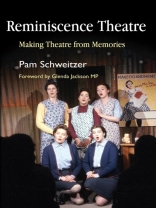Reminiscence theatre is about seeing and realising the dramatic potential in real life stories. It takes verbatim memories as the basis for theatre scripts, using the experiences of older people as a source of artistic productions and therapeutic creativity.
This book is a comprehensive guide to the nature, practice and therapeutic effects of reminiscence theatre. Drawing on examples from a range of real-life case studies, Pam Schweitzer provides practical advice on the process of taking an oral history, creating from it a written script and developing that into a dramatic production, on whatever scale.
The book outlines five components of key significance that the form affords: artistic development through creating original productions; cultural development, by creating reminiscence theatre in multi-cultural contexts, including dual-language productions; educational development through the intergenerational sharing and enactment of memories; psycho-social development for older people by reliving and reshaping past experiences; and health care, by using improvised reminiscence drama therapeutically with people with dementia and their carers.
This book will be of great interest to theatre workers, social work professionals and carers of older people, arts therapy practitioners and students in these fields.
Jadual kandungan
Foreword by Glenda Jackson MP. Preface. Introduction by Faith Gibson. About this book. Background. Part 1. Reminiscence Theatre. Process and Product. 1. Setting Up a Reminiscence Theatre Company. 2. From Interviews to Verbatim Script. 3. Development of Verbatim Plays. 4. Reflecting a Multi-cultural Society. 5. Dramatising Jewish and Irish Elders’ Memories. 6. A Sense of Time and Place. 7. Staging and Touring Reminiscence Theatre. Part 2. Participatory and Inter-generational Projects. 8. Theatrical Scenes Stimulating Audience Participation. 9. Reminiscence Theatre-in-Education Projects. 10. Reminiscence in a Youth Theatre Context. 11. Inter-generational Playmaking in Schools. Part 3. Older People Dramatising their Own Memories. 12. Older People Enacting their Own Memories. 13. Minority Ethnic Elders Make Theatre from their Lives. 14. Using Drama in Outreach Work and in Dementia Care. Conclusion. References. Index.
Mengenai Pengarang
Pam Schweitzer founded Age Exchange Theatre Trust in 1983. It was the first full-time professional theatre company to specialise in touring reminiscence theatre across the UK and Europe and Pam remained its Artistic Director until 2005. In 2000 she was awarded the MBE for services to Reminiscence and she continues to direct the European Reminiscence Network, lecturing, directing and training in reminiscence and related fields. She is an Honorary Fellow of the University of Greenwich.












